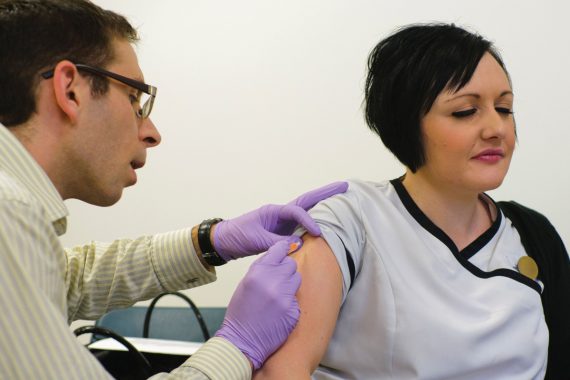Risk of CVT far higher from Covid-19 than vaccination, study suggests

The risk of cerebral venous thrombosis is several times higher after Covid-19 infection than after vaccination, researchers at Oxford University have concluded.
An analysis of CVT incidence after a Covid-19 infection found the blood clot risk was eight times higher than following an Oxford/AstraZeneca vaccine.
The research, which has yet to be peer-reviewed, also found the risk was ten times higher among Covid-19 patients compared with people who had received an mRNA vaccine, such as Pfizer or Moderna.
It found Covid-19 infection created a 100-fold increased risk compared to the rate of CVT in the baseline population between January 2020 and March 2021.
The researchers looked at half a million health records of people with confirmed Covid-19 cases in the US, two weeks after infection, and found a CVT incidence of 39 in a million patients.
It compared with an incidence of four in a million among the 480,000 people who received the Pfizer or Moderna vaccine.
Using separate data, this also compared to a CVT incidence of five in a million among people who had received the AstraZeneca vaccine in Europe, based on figures supplied by the European Medicines Agency.
The baseline rate of CVT risk for all patients in the US data over any two-week period between January 2020 and March 2021 was 0.41 per million people, the researchers reported.
Among just the Covid-19 patients there were 20 cases of CVT – with six of them (around 30%) occurring in patients under the age of 30.
Separately, the researchers looked at portal vein thrombosis and found a similar pattern, with substantially higher rates associated with Covid-19 infection.
They found an incidence of 436 per one million people following Covid-19 infection, compared with 44 in a million following the Pfizer or Moderna vaccines.
What is not yet known, the researchers said, is whether the same or different mechanisms are involved between Covid-19 and vaccines and CVT.
Study leader Professor Paul Harrison, head of the translational neurobiology group at Oxford University, said the figures should be interpreted with caution as data was still accruing but they highlighted the risk of serious thrombotic events associated with Covid-19.
He said: ‘We’ve reached two important conclusions. Firstly, Covid-19 markedly increases the risk of CVT, adding to the list of blood clotting problems this infection causes.
‘Secondly, the Covid-19 risk is higher than seen with the current vaccines, even for those under 30; something that should be taken into account when considering the balances between risks and benefits for vaccination.’
Co-author Dr Maxime Taquet also said the data should be interpreted cautiously because they come from different sources. There also may be other issues with coding or under-reporting in the health records.
He added: ‘However, the signals that Covid-19 is linked to CVT, as well as portal vein thrombosis – a clotting disorder of the liver – is clear, and one we should take note of.’
This article was updated at 1.55pm to reflect the different data sets used in the study
Pulse July survey
Take our July 2025 survey to potentially win £1.000 worth of tokens

Visit Pulse Reference for details on 140 symptoms, including easily searchable symptoms and categories, offering you a free platform to check symptoms and receive potential diagnoses during consultations.
Related Articles
READERS' COMMENTS [3]
Please note, only GPs are permitted to add comments to articles












risk of both is still negligible? same as naturally?
This is essential as I have already encountered significant number of patients DNA their appointments for second dose Astra Zeneca vaccines due to hesitancy (even though they are well due )👿
It would be interesting if those who survived Covid-19 associated Cerebral Venous Thrombosis (CVT) to give their account of their stories in public 🤨
In other stop-press news, the Pope is still a Catholic.